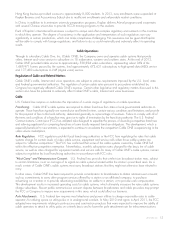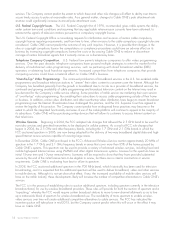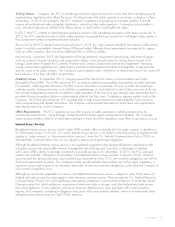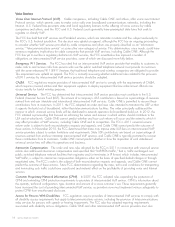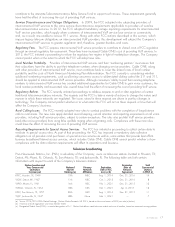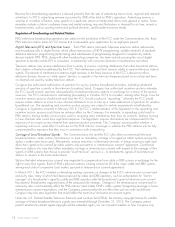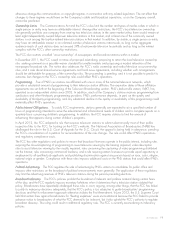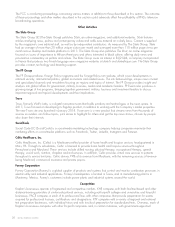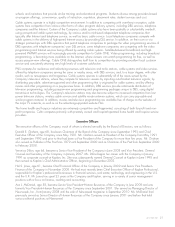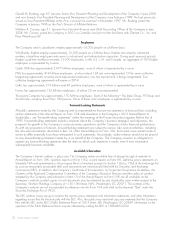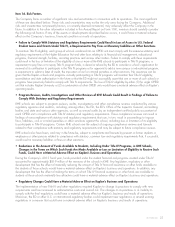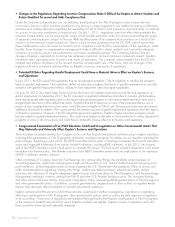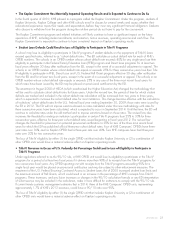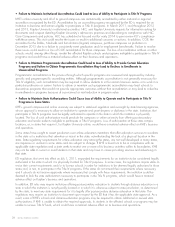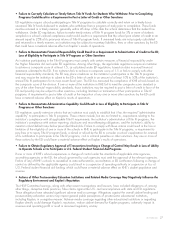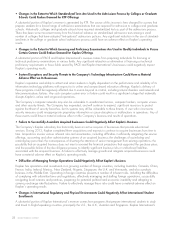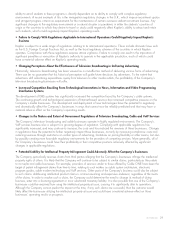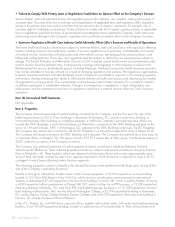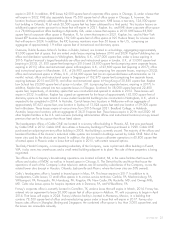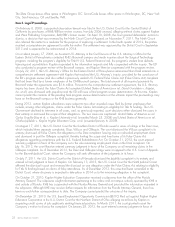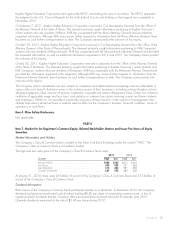Washington Post 2013 Annual Report Download - page 41
Download and view the complete annual report
Please find page 41 of the 2013 Washington Post annual report below. You can navigate through the pages in the report by either clicking on the pages listed below, or by using the keyword search tool below to find specific information within the annual report.Item 1A. Risk Factors.
The Company faces a number of significant risks and uncertainties in connection with its operations. The most significant
of these are described below. These risks and uncertainties may not be the only ones facing the Company. Additional
risks and uncertainties not presently known, or currently deemed immaterial, may adversely affect the Company in the
future. In addition to the other information included in this Annual Report on Form 10-K, investors should carefully consider
the following risk factors. If any of the events or developments described below occurs, it could have a material adverse
effect on the Company’s business, financial condition or results of operations.
• Failure to Comply With Statutory and Regulatory Requirements Could Result in Loss of Access to U.S. Federal
Student Loans and Grants Under Title IV, a Requirement to Pay Fines or Monetary Liabilities or Other Sanctions
To maintain Title IV eligibility, each group of schools combined into an OPEID unit must comply with the extensive statutory and
regulatory requirements of the Higher Education Act and other laws relating to its financial aid management, educational
programs, financial strength, facilities, recruiting practices and various other matters. Failure to comply with these requirements
could result in the loss or limitation of the eligibility of one or more of the KHE schools to participate in Title IV programs, a
requirement to pay fines or to repay Title IV program funds, a denial or refusal by the ED to consider a school’s application for
renewal of its certification to participate in the Title IV programs or for approval to add a new campus or educational program,
a requirement to submit a letter of credit, the imposition of civil or criminal penalties or other sanctions. No assurance can be
given that the Kaplan schools and programs currently participating in Title IV programs will maintain their Title IV eligibility,
accreditation and state authorization in the future or that the ED might not successfully assert that one or more of such schools or
programs have previously failed to comply with Title IV requirements. The loss of Title IV eligibility by either (1) the single OPEID
unit that includes Kaplan University or (2) a combination of other OPEID units would have a material adverse effect on Kaplan’s
operating results.
• Program Reviews, Audits, Investigations and Other Reviews of KHE Schools Could Result in Findings of Failure to
Comply With Statutory and Regulatory Requirements
KHE schools are subject to program reviews, audits, investigations and other compliance reviews conducted by various
regulatory agencies and auditors, including, among others, the ED, the ED’s Office of the Inspector General, accrediting
bodies and state and various other agencies, as well as annual audits by an independent certified public accountant of
each OPEID unit’s compliance with Title IV statutory and regulatory requirements. These compliance reviews can result in
findings of noncompliance with statutory and regulatory requirements that can, in turn, result in proceedings to impose
fines, liabilities, civil or criminal penalties or other sanctions against the school, including loss or limitation of its eligibility
to participate in Title IV programs. Certain KHE schools are the subject of ongoing compliance reviews and lawsuits
related to their compliance with statutory and regulatory requirements and may be subject to future compliance reviews.
KHE schools also have been, and may in the future be, subject to complaints and lawsuits by present or former students or
employees or other persons related to compliance with statutory, common law and regulatory requirements that, if successful,
could result in monetary liabilities or fines or other sanctions.
• Reductions in the Amount of Funds Available to Students, Including Under Title IV Programs, in KHE Schools,
Changes in the Terms on Which Such Funds Are Made Available or Loss or Limitation of Eligibility to Receive Such
Funds, Could Have a Material Adverse Effect on Kaplan’s Business and Operations
During the Company’s 2013 fiscal year, funds provided under the student financial aid programs created under Title IV
accounted for approximately $819 million of the revenues of the schools in KHE. Any legislative, regulatory or other
development that has the effect of materially reducing the amount of Title IV financial assistance or other funds available to
the students of those schools would have a material adverse effect on Kaplan’s business and operations. In addition, any
development that has the effect of making the terms on which Title IV financial assistance or other funds are available to
students of those schools materially less attractive could have a material adverse effect on Kaplan’s business and operations.
• Regulatory Changes Could Have a Material Adverse Effect on Kaplan’s Business and Operations
The implementation of new Title IV and other regulations required Kaplan to change its practices to comply with new
requirements and has increased its administrative costs and overall risk. The changes to its practices or its inability to
comply with the final regulations could have a material adverse effect on Kaplan’s business and results of operations.
Moreover, the ED or other U.S. or international regulatory bodies could implement new regulations or amend existing
regulations in a manner that could have a material adverse effect on Kaplan’s business and results of operations.
2013 FORM 10-K 23


